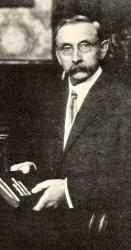Planning worship?
Check out our sister site, ZeteoSearch.org,
for 20+ additional resources related to your search.
- |
User Links
Search Results
The Heavenly Crown
Author: Anon. Appears in 14 hymnals First Line: Gracious Saviour, can it be Refrain First Line: Yes, oh, yes, if you believe Lyrics: 1 Gracious Saviour, can it be
There awaits a crown for me,
Set with gems so pure, so bright,
Sparkling each with heav’nly light?
Refrain:
Yes, oh, yes, if you believe,
Jesus has a crown to give;
Yes, oh, yes, if you believe,
Jesus has a crown to give.
2 Can it be a harp of gold,
Glitt’ring bright, these hands shall hold?
That this voice shall join the song,
Sung by angels round the throne? [Refrain]
3 Shall I pass the pearly gates?
Shall I walk the golden streets?
Shall I see the great white throne,
And behold the Lamb thereon? [Refrain] Used With Tune: [Gracious Saviour, can it be]
The Heavenly Crown
[Gracious Saviour, can it be]
Appears in 1 hymnal Composer and/or Arranger: Landloff Incipit: 34556 65334 54423 Used With Text: Gracious Saviour, Can It Be?
[Gracious Saviour, can it be]
[Gracious Saviour, can it be]
Appears in 1 hymnal Composer and/or Arranger: J. H. Hall Incipit: 32123 45222 12343 Used With Text: The Heavenly Crown
[Gracious Saviour, can it be]
[Gracious Savior, can it be]
Appears in 1 hymnal Composer and/or Arranger: Judson L. Moore Incipit: 55617 21555 67132 Used With Text: Gracious Savior
[Gracious Savior, can it be]
Gracious Savior
Author: Anon. Hymnal: Notes of Praise #30 (1890) First Line: Gracious Savior, can it be Refrain First Line: Yes, O yes, if you believe Topics: Solos and Choruses Languages: English Tune Title: [Gracious Savior, can it be]
Gracious Savior
Gracious Saviour, Can It Be?
Hymnal: Song Worship for Sunday Schools #24 (1884) First Line: Gracious Saviour, can it be Languages: English Tune Title: [Gracious Saviour, can it be]
Gracious Saviour, Can It Be?
The Heavenly Crown
Author: Anon. Hymnal: The Crowning Day #63 (1894) First Line: Gracious Saviour, can it be Refrain First Line: Yes, oh, yes, if you believe Lyrics: 1 Gracious Saviour, can it be
There awaits a crown for me,
Set with gems so pure, so bright,
Sparkling each with heav’nly light?
Refrain:
Yes, oh, yes, if you believe,
Jesus has a crown to give;
Yes, oh, yes, if you believe,
Jesus has a crown to give.
2 Can it be a harp of gold,
Glitt’ring bright, these hands shall hold?
That this voice shall join the song,
Sung by angels round the throne? [Refrain]
3 Shall I pass the pearly gates?
Shall I walk the golden streets?
Shall I see the great white throne,
And behold the Lamb thereon? [Refrain] Tune Title: [Gracious Saviour, can it be]
The Heavenly Crown
Anonymous
Person Name: Anon. Author of "Gracious Savior" in Notes of Praise In some hymnals, the editors noted that a hymn's author is unknown to them, and so this artificial "person" entry is used to reflect that fact. Obviously, the hymns attributed to "Author Unknown" "Unknown" or "Anonymous" could have been written by many people over a span of many centuries.
Anonymous
Jacob Henry Hall

1855 - 1941 Person Name: J. H. Hall Composer of "[Gracious Saviour, can it be]" in The Crowning Day Jacob Henry Hall, 1855-1941
Born: January 2, 1855, near Harrisonburg, Virginia.
Died: December 22, 1941.
Buried: Dayton, Virginia.
Son of farmer George G. Hall and Elizabeth Thomas Hall, Jacob attended singing schools taught by Timothy Funk when he was a boy. As his love of music progressed, he earned money by trapping quail and bought a German accordion; he soon learned to play one part while singing another. After he and his brother jointly purchased an organ, he taught himself to play hymn tunes, Gospel songs, and anthems. He went on to study music theory, harmony, and composition in Harrisonburg and elsewhere, and in 1877 attended a Normal Music School in New Market, Virginia, taught by Benjamin Unseld and P. J. Merges. Afterward, he partnered with H. T. Wartman for two years to conduct singing schools and conventions. In 1890, Hall attended Dana’s Musical Institute in Warren, Ohio, and a normal school run by George & F. W. Root at Silver Lake, New York. He later served as principal of the National Normal School of Music.
Hall’s works include:
Hall’s Songs of Home, 1885
The Star of Bethlehem (Dayton, Virginia: Ruebush-Kieffer Company)
Musical Million (assistant editor)
Spirit of Praise, with William Kirkpatrick & Charles Case (Dayton, Virginia: The Ruebush-Kieffer Company, 1911)
Hall’s Quartettes for Men, 1912
Biography of Gospel Song and Hymn Writers/em> (New York: Fleming H. Revell Company, 1914)
Sources--
Hall, pp. 329-34
Lyrics--
Glorious Morning Dawns, The
O Thou Whose Matchless Power Controls
--hymntime.com/tch
Jacob Henry Hall
Julia G. Foster
Author of "Gracious Saviour, can it be" in Songs of Delight, for the Sunday School
Julia G. Foster


 My Starred Hymns
My Starred Hymns


